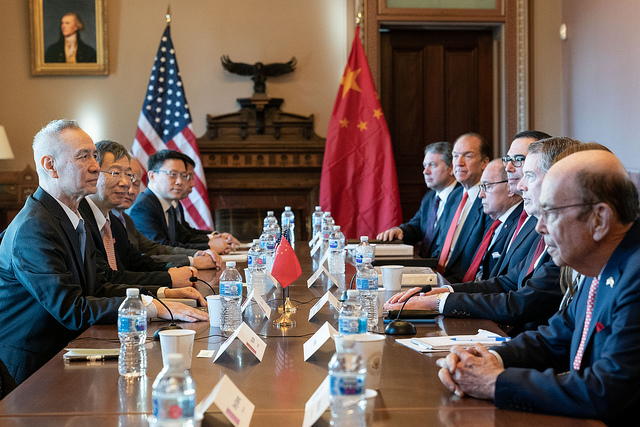China’s Foreign Investment Law Fails to Address U.S. Concerns
Amid the ongoing U.S.-China trade talks, China has fast-tracked a piece of legislation that serves as its most immediate answer to U.S. concerns regarding Chinese state-directed economic policies and barriers to market access. The draft Foreign Investment Law intends to reform China’s foreign investment regime; its vague provisions, however, will have more far-reaching national security implications for the United States.

Published by The Lawfare Institute
in Cooperation With

Amid the ongoing U.S.-China trade talks, China has fast-tracked a piece of legislation that serves as its most immediate answer to U.S. concerns regarding Chinese state-directed economic policies and barriers to market access. The draft Foreign Investment Law intends to reform China’s foreign investment regime; its vague provisions, however, will have more far-reaching national security implications for the United States. If such provisions are not adequately addressed before a deal is finalized, Washington will have missed an ideal opportunity to push for so-called “structural reforms” vis-a-vis China’s economic policies while preventing loopholes that allow for the Chinese government’s intrusion into any foreign business activity that it sees as endangering its national security—a category that appears to be increasingly broad from Beijing’s perspective.
The new law is set to be introduced on March 8 and passed the following week at the ongoing annual meeting of China’s National People’s Congress (NPC). The content, however, falls short of anything that will fundamentally reshape China’s openness to foreign investors and enterprises. If the United States agrees to a deal after the law is passed but fails to call for serious and sustained enforcement of supporting policies enabling real market access, then U.S. and foreign businesses will likely end up right where they began following the finalization of any deal between President Trump and Chinese President Xi Jinping.
Initially released for public comment in early 2015, the draft law has until recently stalled in its progression through the NPC Standing Committee—China’s top legislative body. The Standing Committee released a new draft of the law for public comment in late December 2018, in turn placing it on an accelerated timeline for a vote at this year’s NPC session. This new draft, along with an updated version released in late January, still intends to establish national, or nondiscriminatory, treatment for foreign investors and serve as the “basic law” replacing China’s current foreign investment regime. It was also shortened significantly, potentially in an effort to grant the government “more leeway to craft implementing rules after the Law’s enactment” and postpone the more difficult questions surrounding implementation.
Having been pushed through the legislative process on an accelerated timeline in tandem with the U.S.-China trade talks, the draft law contains prospective commitments to foreign investors that carry a number of risks—particularly in terms of the articles related to technology transfer and national security. The resulting ambiguity presents little hope that the provisions will foster a fairer and more equitable regime for foreign investors. Specifically:
Article 22 of the draft law states that “administrative organs and their employees shall not force the transfer of technology through the use of administrative measures”—an addition that effectively serves as an answer to long-standing U.S. demands on this issue. Yet the Chinese government has often claimed that such theft does not occur as a matter of policy, despite rampant evidence to the contrary. The inclusion of this language appears to be more of a pronouncement affirming the central government’s position on the matter—while it may deter lower-level Chinese Communist Party (CCP) cadres and members of the bureaucracy, it is unlikely to change anything substantial on the ground.
Article 39 allows China to take “corresponding measures” in response to prohibitive or restrictive investment practices by foreign countries. This is most immediately relevant for the Committee on Foreign Investment in the United States, which has blocked past Chinese investments on national security grounds. The Chinese leadership has historically employed a variety of measures to retaliate against foreign actions that it perceives as threatening CCP authority or the country’s national interest—with the most recent high-profile case being the detention of numerous Canadian citizens following the arrest of Huawei executive Meng Wanzhou. This raises the concern that China will find grounds to exact retribution on foreign companies in response to investment screens abroad, even if there is no legitimate national security concern.
Articles 6 states that foreign investors and foreign-invested enterprises shall not harm national security or the public interest, without any further elaboration. Article 34 further states that any investment that affects or may affect national security will undergo a security review. This vague language echoes Article 59 of China’s 2015 National Security Law, which originally mandated security reviews for such investments. Together, these provisions essentially give the state—and, in turn, the CCP—free rein to intervene in a wide range of investment activity, signaling to foreign investors that they are better off avoiding any investment in an area that may be construed as politically sensitive or threatening.
That the law is being rushed through a significantly shortened deliberative process and is reduced in scope means that its ambiguous provisions will be dictated by circulars and implementing regulations and are unlikely to change facts on the ground in the near term. More importantly, enforcement will be dictated by those with power in China’s political system; the fact that the CCP enjoys complete authority over the Chinese legal system will limit the impact of some of the law’s otherwise encouraging provisions. These discrepancies in practice raise questions about the ultimate effectiveness of China’s pending legislation and whether it will be too little, too late in its attempts to shape the overall trajectory of the country’s investment climate.
To be clear, the idea that one Chinese government-supported or affiliated entity is conducting a mass exploitation of any foreign business in its midst is at best an oversimplification. Whether foreign companies are explicitly required to hand over intellectual property to conduct business in China varies from sector to sector and is, in certain cases, based on the structure of individual deals and business ventures.
The more vexing problem is the opacity of China’s political system, which effectively allows for unlimited CCP and government intrusion into any activity that might be considered threatening to public or national security. In more sensitive technological sectors, for example, surveillance and even commercial espionage are par for the course. Xi’s remarks at the first meeting of the Central Commission for Comprehensive Law-Based Governance in August 2018—during which he stated that China “must not walk down the Western path of ‘constitutionalism,’ ‘separation of powers,’ [or] ‘judicial independence’”—exemplify the mentality of the CCP leadership toward the country’s legal system.
As a result, the Foreign Investment Law is a modest step in the direction of making China’s investment climate more appealing to and equitable for foreign investors. If implemented effectively, it may benefit certain industries and lead to fairer treatment of foreign companies in China. The larger problems are deeply rooted in China’s political system. The reality is that, so long as the CCP remains focused on asserting its authority across all aspects of Chinese society, foreign companies will need to operate in such a way that their business is not perceived as undermining CCP rule or social stability.
Moreover, in light of China’s approach to foreign policy in recent years, it remains unlikely that foreign investors will be treated by the Chinese government as anything other than an extension of the interests of their own country of origin. As long as the Chinese leadership sees its own industry giants and businesspeople as manifestations of China’s own national interests—to be both overseen and protected with the full force of China’s public and national security apparatuses—it will treat foreign entities and citizens in the same way. If the rule of law is then abrogated to exact retribution for the actions of foreign governments on an ad hoc basis, legislation such as the pending Foreign Investment Law will be rendered ineffective, if not meaningless, over the long term.
Given the current law’s shortcomings, China should at the very least implement supporting regulations to ensure the law’s good-faith implementation in sectors that are legally open to foreign investment. Xi’s recent direction that the Central Commission for Comprehensive Law-Based Governance draw up “unified fundamental laws on foreign capital” could hint at movement in this direction and signals that the CCP is prioritizing legislative work in this area for the coming year.
The Trump administration, moreover, now has an opportunity to address this specific legislation in the ongoing bilateral trade talks. While the United States cannot fundamentally alter the course of China’s political system, it can press for definitive structural reforms by pointing to this legislation as a key metric for whether China is making good on its commitments to treat U.S. businesses and investors fairly, irrespective of broader trends in the two countries’ relations. The administration could also make any final trade deal contingent on the reopening of discussions on a bilateral investment treaty—which, as former U.S. Trade Representative Michael Froman notes, could involve investor- and state-to-state dispute settlement provisions, in turn enabling a legal recourse mechanism for both individual investors and the U.S. government. Despite the administration’s skepticism of such mechanisms, they may serve as a viable course to hold China accountable to its commitments.
Beyond this, however, the administration should seek to secure enforcement mechanisms that prevent U.S. investors and companies from being illegitimately drawn into bilateral disputes by having their activity stifled on the vague basis of “national security.” Such a possibility is an unacceptable risk if China seeks to ensure a stable, predictable investment regime that adheres to the rule of law and treats foreign investors fairly.
Update, Mar. 10: Chinese state media has released an updated draft of the law provided to NPC delegates. The articles referenced herein remain the same.





